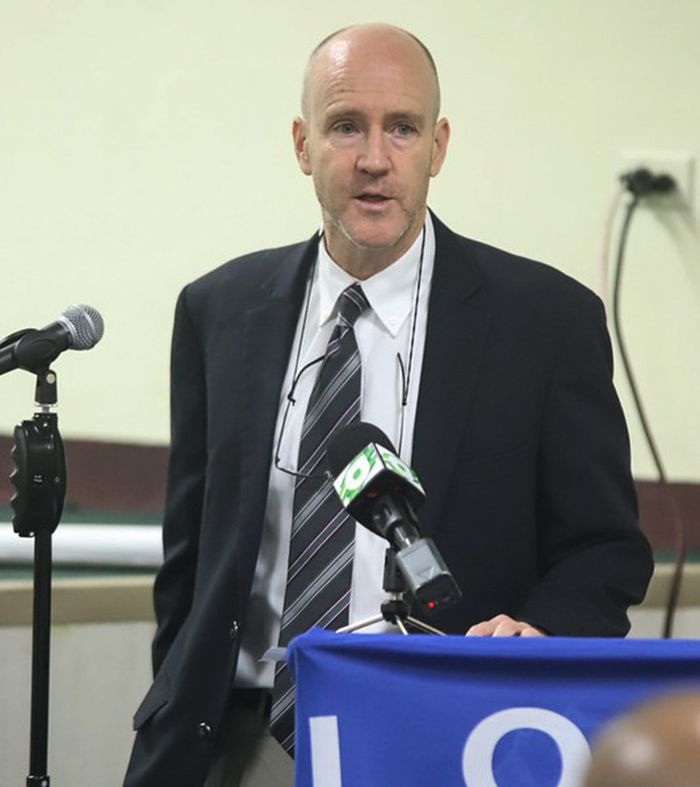The International Organization for Migration (IOM) in collaboration with the Government of Guyana recently released a report on improving the management of migrants including the use of electronic passports and collection of data across borders.
The report titled “Guyana Needs Assessment on Migration Governance” was recently launched at a virtual event with several government, private sector, and civil society stakeholders, an IOM release stated last week. The study, it informed, was implemented by the IOM under the Western Hemisphere Program (WHP) and funded by the US Department of State Bureau of Population, Refugees and Migration. The event served as an introduction to IOM’s Needs Assessments on Migration Governance and presented the key findings and needs identified in the report, which was facilitated by IOM Research Officer, Briana Mawby, and Lead Research Consultant, Tiarra Simon.
IOM was established in 1951 and is a United Nations organisation working on migration issues.
Some of the actions identified by the Government of Guyana that can significantly improve the nation’s Migration Governance policy are: implementing electronic passports, collecting migration data across borders, and facilitating automatic information-sharing between migration-related entities.
Chief of Mission in Guyana and Coordination Officer for the Caribbean, Robert Natiello, remarked that the “Guyana Needs Assessment on Migration Governance” is part of a series of other reports that covers the Caribbean and Central America.
“The report for Guyana has been contextualised to the country’s particular situation and provides key information to support the government in understanding current migration governance systems and the steps we can take to improve those systems,” the IOM official was quoted as saying. He also disclosed that the organisation is currently working with the Government of Guyana on the development of the Guyana Migration Profile. This profile, he explained, will provide a summary of the state of migration in Guyana and will contribute to the development of migration policy and law.
In his address, Foreign Secretary in the Ministry of Foreign Affairs and International Cooperation, Robert Persaud, said that the Guyana Needs Assessment on Migration Governance comes at an opportune time in the country’s national development.
“We recognize that migration and its potential socioeconomic impact on the country must be carefully considered. We are cognisant that a comprehensive whole-of-society response must be formulated and supported, as well as properly implemented.”
Persaud said that the government has worked closely with IOM on projects that provide data to better understand the impact of migration and is committed to work towards creating policies that would lead to successful migration governance. According to the Foreign Secretary, better migration governance policy will guarantee that all the people of Guyana, both native and foreign-born will be able to contribute to society. He noted that the Guyana Needs Assessment also complements the work of the Migration Profile.
According to the release, IOM, through the WHP, conducts research to provide governments with evidence on which to base the development and review of policies and practices related to migration and migration governance. This report provides an easy-to-use tool and reference for government officials and other stakeholders on which to base proposals and activities and is divided into six themes to guide policymakers’ consideration on the areas most relevant to their field as it relates to migration governance.
Among the report’s findings were that the specific needs of migrants are not considered in policy documents, particularly in relation to disaster risk reduction. Therefore, the release pointed out, it is possible that many migrants are not being reached by crisis plans and communications. To address these concerns the study recommended that language translations for emergency situations and essential migration information be available in Spanish, Portuguese, Indigenous languages, and Haitian Creole. This, it says, would offset the negative impacts of environmental changes as drivers of forced migration.
A key recommendation was made to manage labour migration including the development of a multi-agency coordination mechanism and to develop and implement a labour policy and strategy with provisions on the integration of migrants into the formal labour force.
Furthermore, the study also recommended amendments to the Prevention Against Discrimination Act to include migrant status, and persons of the Lesbian, Gay, Bisexual, Transgender, Intersex and Queer (LGBTIQ+) community, as well as the decriminalisation of homosexuality under the Criminal Law (Offences) Act. In addressing the vulnerabilities of women and girls the report noted government’s commitment to enhancing officials’ capacity on gender-based violence referrals.
The report was developed in an accessible format that provides data on the structures and policies in regulating migration governance and identify priorities for strengthening government capacity to manage migration effectively.
More information on the Guyana Needs Assessment on Migration Governance report can be accessed at: https://publications.iom.int/books/guyana-needs-assessment-migration-governance, the release added.






